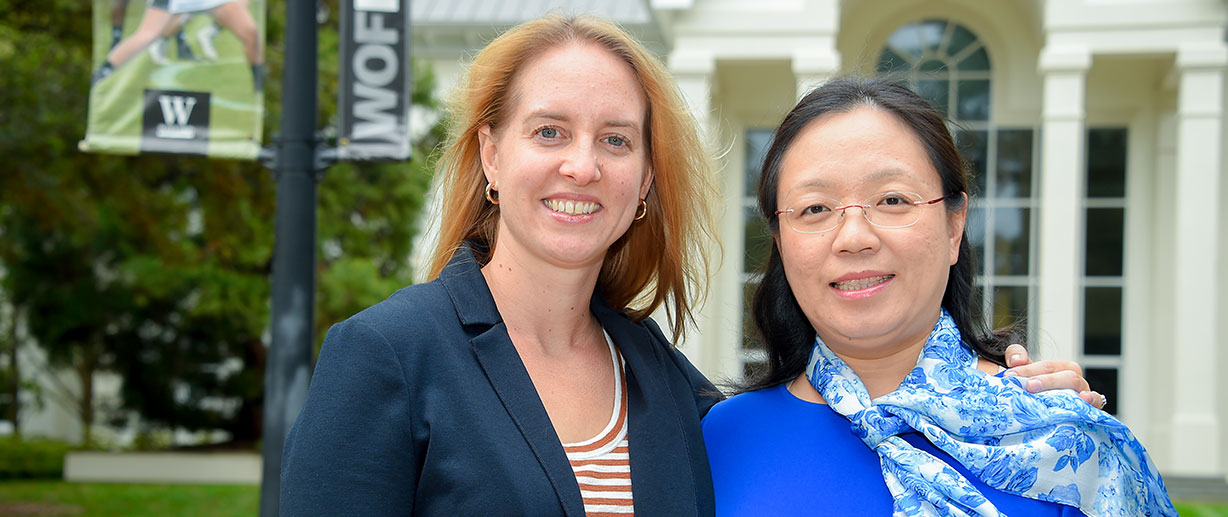SPARTANBURG, S.C. – Dr. Courtney Dorroll and Dr. Yongfang Zhang are using Mellon Diversity and Inclusive Pedagogy Fellowships to approach teaching and classroom instruction in new and different ways.
Dorroll, assistant professor of religion, has been incorporating the teaching of self-care in her classroom, something she finds especially appropriate in Middle Eastern and North African Studies and religion courses. According to Dorroll, topics such as Islamophobia and xenophobia can be distressing and politically-charged. Because the class cannot avoid the subjects, practicing self-care can help ease tension and reduce stress.
Dorroll became interested in the pedagogy of self-care after attending a conference on self-care in the classroom in 2018. The experience inspired her to begin classes with guided meditation and to include self-care days into the semester. Now she also incorporates student reflections on self-care and scholarly works on self-care in the curriculum.
“I get a lot of honest reflections from students who struggle with implementing self-care,” Dorroll says. She attributes the challenges to American cultural expectations of productivity, success and efficiency. Dorroll, however, believes that self-care can improve productivity.
Dorroll has found the scholarly literature on self-care to be broader than she expected. Popular self-care and personal development books have been prevalent in recent years, but there have also been several scholarly works observing the recent obsession with self-care, some of which are critical of the practice. Dorroll wants her students to be aware of both the negatives and the positives of self-care so they can understand better how to implement self-care in their own lives.
“Students can take [self-care] away as sustainability practices” that can foster compassion and nurture growth, Dorroll says. Although not a requirement for the Mellon Diversity and Inclusive Pedagogy Fellowship, Dorroll is also developing a religion course that would compare religious rituals such as prayer and meditation with acts of self-care.
Zhang, assistant professor of Chinese, is using the fellowship to study differentiated teaching as it applies in modern language classrooms.
According to the Higher Education Institute, the number of American students taking language courses besides English has been steadily falling over the past decade. Several studies have found that the most common reason for this decline has been that many students believe learning another language is too difficult. In response, Zhang is experimenting with teaching the same material in different ways to best meet the individual learning needs of students.
“It’s impossible to have a homogenous classroom in any school, in any subject,” Zhang says. Students change each semester and each year. By focusing on differentiated teaching, she seeks instructional methods that will reach the most students.
Zhang was introduced to differentiated teaching about 20 years ago when she moved from China to the United States and participated in a teacher-training program meant to introduce East Asian professors to the concept. For her, the American education system was vastly different from the “one-size-fits-all” approach she grew up with in China. Since this training, she has worked to incorporate the pedagogy of differentiated teaching in her courses.
The fellowship allows her to expand her investigation into the topic and collaborate more with others teaching modern languages.
Zhang has discovered that students learn best from their peers and when they have opportunities to articulate lessons and concepts in their own words. In this environment, “we are not teachers, we are facilitators,” says Zhang. Her role then becomes to “know and activate prior knowledge since it plays a crucial role in students’ learning.”
According to Zhang, differentiated teaching recognizes that students are diverse in their knowledge, skills and perspectives. Zhang has been assigning scholarly articles on differentiated teaching, in addition to lessons in Chinese, so students gain a metacognitive understanding of how they are taught. Zhang believes knowing the theory behind differentiated teaching will make students even more passionate about learning.
As part of their projects, Dorroll and Zhang are collecting qualitative data, primarily from students reflections. The data will be included in articles evaluating the academic effectiveness of self-care and differentiated teaching.
The Mellon Diversity and Inclusive Pedagogy Fellowship, funded by the Mellon Grant from the Andrew W. Mellon Foundation, encourages the implementing and experimenting of academic pedagogies that encourage diversity in the classroom and beyond. Dr. Trina Jones, professor of religion and associate provost for curriculum and co-curriculum, oversees the Mellon Grant and by extension the Mellon Diversity and Inclusive Pedagogy Fellowship.
